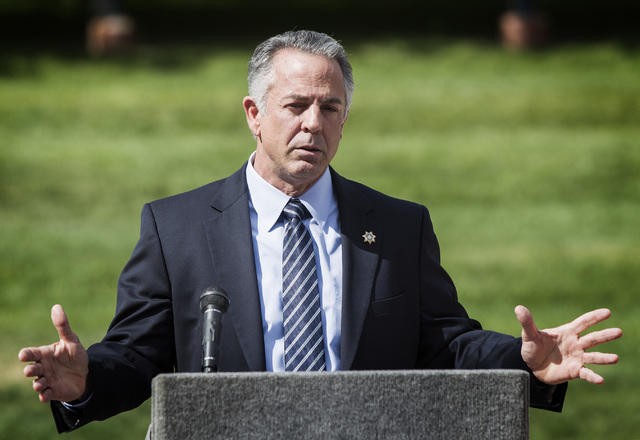Las Vegas police warn about enforcement calls on Uber

If Uber and other transportation network companies take hold in Southern Nevada, the Metropolitan Police Department could wind up responding to regulatory enforcement calls involving them, Clark County Sheriff Joe Lombardo said.
Speaking Monday at a press conference scheduled by the Livery Operators Association, a group of taxi and limousine companies fighting against legislation that would enable ride-hailing companies to operate in the state, Lombardo said he expects Metro would be called on any incident involving an Uber driver.
Under legislation that has been proposed and failed twice in the Legislature this session, the Public Utilities Commission of Nevada would be the regulatory body overseeing transportation network companies.
Unlike the Nevada Taxicab Authority and Nevada Transportation Authority, the Public Utilities Commission does not have regulatory enforcement officers. Regulatory enforcement is different from standard police work because officers enforce transportation regulations applying only to those industries.
For example, regulatory enforcers can cite taxi drivers for illegally diverting or long-hauling passengers. Taxicab Authority officers also investigate all accidents involving a cab before it can be placed back in service.
Lombardo expects Metro, which the sheriff says already is undermanned, would have to respond to calls involving transportation network companies.
Lombardo said the types of calls his force would respond to would range from traffic accidents to calls involving disputes between passengers and Uber drivers.
Uber officials said Monday that Lombardo’s fears are premature because they expect the Public Utilities Commission would set up its own enforcement system in its rulemaking process, as governments in California and Colorado have done, if transportation network company legislation is passed in Nevada.
Monday’s Livery Operators Association event pulled out all the stops on the industry’s opposition to legislative proposals to put companies like Uber on the road. Brent Bell, who operates the Bell Transportation family of companies throughout the state, said the association isn’t opposed to transportation network companies operating — it just wants those companies to operate under the same rules as cab companies.
“Uber can already operate in Nevada under existing regulation, they simply have chosen not to,” he said.
In addition to Lombardo and Bell, speakers at the event included Steve Sisolak, chairman of the Clark County Commission, which approved a resolution on transportation network companies last week; Matt Gamon, vice president of Wilson Perkins Allen Opinion Research, which conducted a poll on transportation regulation for the association; Sandy Heverly, who heads Stop DUI in Southern Nevada; and Madonna Long, a consumer advocate for people with disabilities.
The speakers reiterated issues that have been at the center of the Uber debate since November when the San Francisco-based ride-hailing company shut itself down after losing a Nevada court case.
Sisolak, a former Nevada Taxicab Authority board member and the commission resolution have urged a level playing field for taxi companies and ride-hailing companies and want companies to have the same law enforcement background checks as those undertaken by taxi drivers.
Gamon produced results of a poll of 504 registered Nevada voters and 514 registered Clark County voters that say 76 percent support requiring Uber and Lyft, a similar transportation network company, to follow the same regulations as local taxi companies.
Heverly decried Uber’s “outlandish claims” of helping to reduce the number of drunken-driving incidents in California last year. She said Uber is taking credit for a number of factors that led to the reduction.
Long said Uber can’t assure that disabled passengers would be treated the same as all customers and she told horror stories of Uber drivers putting assistance dogs in the trunks of their cars when transporting a disabled passenger.
Uber officials have replies to every claim.
They noted that a poll commissioned by the Las Vegas Global Economic Alliance found that 75 percent of Nevadans want ride-sharing companies to be allowed to freely operate in the community, even if it means cab drivers would make less money.
Uber officials say when riders are empowered with more transportation options, people make better decisions when it comes to driving under the influence of alcohol. The company has partnered with Mothers Against Drunk Driving to urge people to get an Uber ride rather than drive drunk.
Uber claims that is background checks are actually better than the FBI’s. They say the multilayered driver screening includes county, federal and multistate checks and the rating system and traceability of the Uber platform gives riders and drivers unprecedented transparency. Court records the company accesses are manually pulled and include the complete record: arrest, if charges are added, dropped or amended. They say that doesn’t always happen with FBI records and they’re aren’t updated in real time.
Bell said Monday morning that he believes the fight with Uber wasn’t over.
He was right.
Hours after the press conference, the Senate passed the so-called “Uber bill,” which was presumed to have been dead after it failed to win the required 14-vote supermajority in the Senate. The bill next goes to the Assembly where Bell said he expects the legislation to be vetted even more vigorously than it was by the Senate.
Bell said he and his colleagues and lobbyists have spent more time working with Assembly members to convince them of the need for better safety regulations for transportation network companies.
Following Monday’s Senate vote, Steve Thompson, general manager of Uber’s Nevada operation, said, “Today, the Nevada State Senate, under the leadership of Sen. (James) Settelmeyer (R-Minden), took an important step forward, leading an effort to expand transportation options and support more job opportunities and safer roads throughout the state.”
Contact reporter Richard N. Velotta at rvelotta@reviewjournal.com or 702-477-3893. Find @RickVelotta on Twitter.